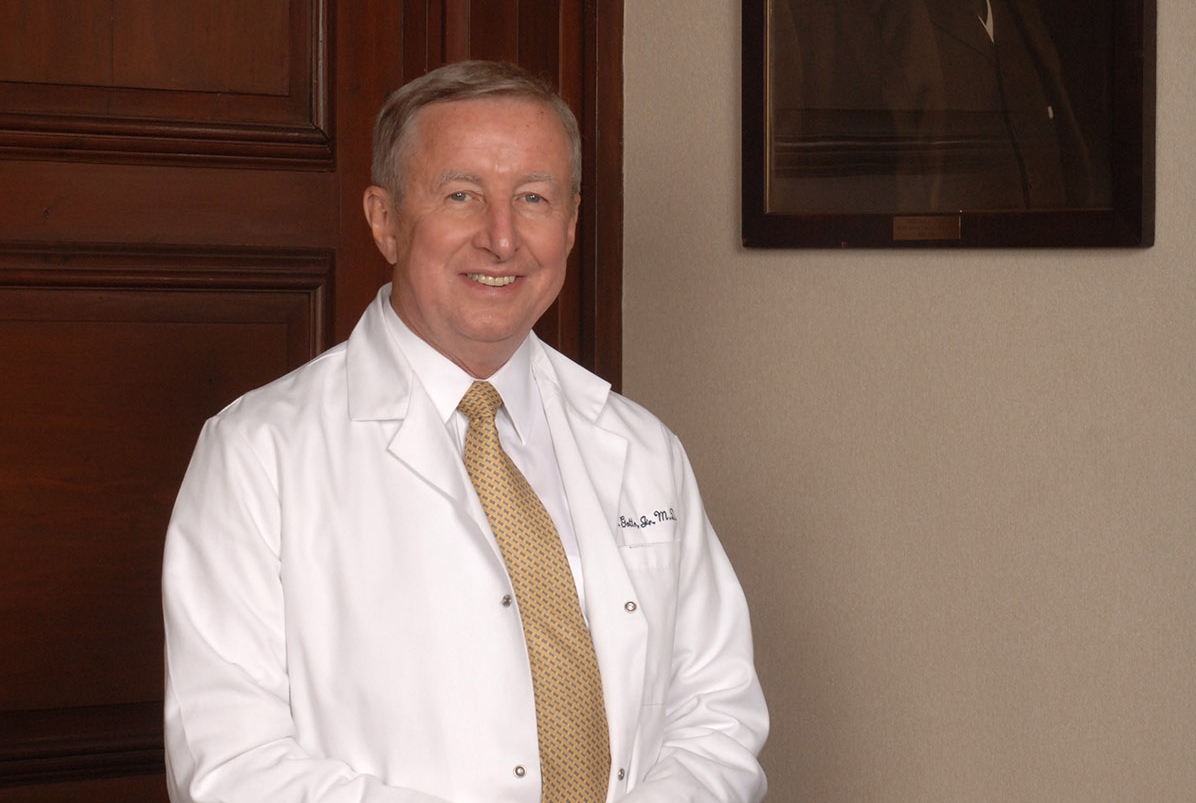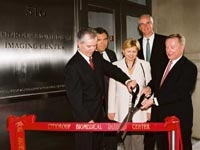
Cutting the ribbon at the dedication of the Citigroup Biomedical Imaging Center are (from left) Dr. Douglas Ballon; Charles Prince; Dr. Hedvig Hricak; and Dr. Antonio Gotto.
Unlocking the mysteries of the body's biological and cognitive processes—with the help of some of the most advanced functional imaging equipment in the world—will be the day-to-day work of researchers in Weill Cornell's new Citigroup Biomedical Imaging Center.
The new Imaging Center, located on East 72nd Street, houses state-of-the-art research and diagnostic imaging technology—including a Magnetic Resonance Imaging and Spectroscopy facility, a Positron Emission Tomography (PET) facility, a Radiochemistry facility, and a high-field Nuclear Magnetic Resonance (NMR) Spectroscopy facility. The Center's non-invasive imaging facilities will enhance patient care and allow Weill Cornell research scientists and their collaborators to visualize the functioning of the living brain and other human organs.
Weill Cornell celebrated the opening of the new Imaging Center with a dedication ceremony on July 17.
"With the generous support provided by our benefactors, sponsors and friends, Weill Cornell has been able to develop a world-class biomedical imaging facility that will make fundamental contributions to the understanding, treatment and prevention of major disorders such as cancer, Alzheimer's disease, schizophrenia, depression, heart disease and stroke," said Dr. Antonio Gotto, dean of Weill Cornell Medical College.
"One of the most exciting features of the Center is the close proximity of the MRI, PET, NMR, and Radiochemistry facilities to one another. The building design, for example, facilitates the complementary use of MRI and PET methods to provide the most direct examination of abnormalities in brain function associated with specific psychiatric and neurological problems," said Dr. Douglas Ballon, director of the Imaging Center and associate professor of physics in radiology.
Speaking at the dedication ceremony were Dr. Gotto; Hunter Rawlings, president of Cornell University; Dr. Hedvig Hricak, chair of the Department of Radiology at Memorial Sloan-Kettering Cancer Center (MSKCC), which is collaborating with Weill Cornell in the operation of the Radiochemistry facility; Charles Prince, chief operating officer of Citigroup; and Dr. Ballon. (Dr. Hricak spoke on behalf of Dr. Harold Varmus, president and C.E.O. of MSKCC, who was unable to attend the dedication, and Mr. Prince spoke for Sanford Weill, chairman and CEO of Citigroup, who was at a State Dinner in Washington, D.C.)
The Citigroup Foundation provided the lead gift of $6 million to establish the Imaging Center. Major gifts were also received from the Laurent & Alberta Gerschel Foundation (more than $2 million) and the DeWitt Wallace/New York Hospital Fund at The New York Community Trust ($2 million). Additional support came from the Florence Gould Foundation ($1 million), the Ira W. DeCamp Foundation ($500,000) and the Abby Rockefeller Mauzé Charitable Trust ($250,000), among others.
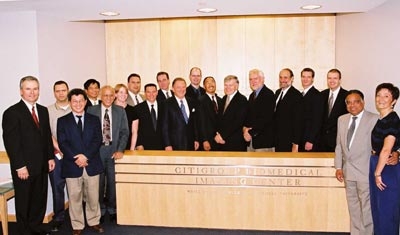
Staff of the Citigroup Biomedical Imaging Center: (from left) Dr. Douglas Ballon, Diego Bastidas, Howard Sheh, Josefino Borja, Dr. Paresh Kothari, Dr. Julie Kneller, Dr. Jonathan Dyke, Muc Du, Dr. Clay Bracken, Dr. Stanley Goldsmith, Dr. Klaus Hamacher, Calvin Lom, Dr. Ronald Finn, Dr. Martin Graham, Pete Capitelli, Jonathan Marley, Dr. Richard Watts, Dr. Shankar Vallabhajosula, and Dr. Lale Kostakoglu.
New Technology and Facilities
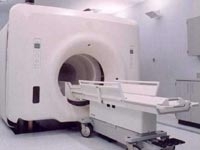
The Magnetic Resonance Imaging and Spectroscopy Facility will support high-resolution imaging virtually anywhere in the body. Investigators will use this instrument to study a wide range of diseases, from neurological and psychiatric disorders to cancer and vascular disease. Functional magnetic resonance imaging (fMRI) is a special type of MRI that will provide a means for researchers to analyze brain activity directly and non-invasively. This powerful tool allows a visualization of the interactions among multiple brain regions during normal and abnormal perceptual, cognitive, emotional and behavioral processing.
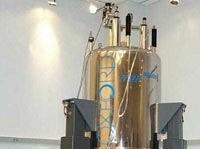
Nuclear Magnetic Resonance (NMR) Spectroscopy is one of the primary methods available for the analysis of protein structures, providing an in-depth view of molecules while in liquid form. The NMR spectrometer also gives the clearest view of proteins that cannot be crystallized, and allows for the observation of changes in shape that occur as proteins function. Understanding the "architecture" of molecules will permit a better understanding of how disease begins and progresses, ultimately leading to development of better diagnostic procedures, new drugs and other treatment strategies.
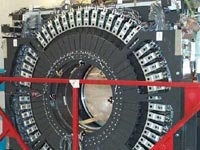
The Positron Emission Tomography (PET) Facility, which covers about 4,000 square feet of the Imaging Center, can be used to scan the entire body or selected organs. PET precisely measures physiologic function, detects metabolic changes in tissue, displays blood flow, tracks alterations in biochemical processes, and more. It can help physicians evaluate patients for coronary artery bypass or angioplasty procedures, diagnose psychiatric and neurological diseases, assess head trauma and movement disorders, and help diagnose and stage tumor malignancies.
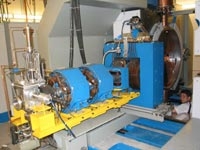
The Radiochemistry Facility is essential to the continued widespread utilization and scientific development of PET in that it will produce various positron-emitting radiolabeled pharmaceutical drugs designed and engineered to complement the pharmacokinetics of the clinical molecular target. The preparation of these unique drugs requires a source of radionuclide and the tools for subsequent synthesis of the drug incorporating the radionuclide. The facility will support electronic generation of specific short-lived, positron-emitting radionuclides and the chemical synthesis of designed pharmaceutical agents.

